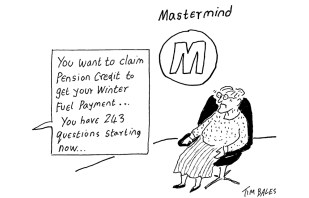Imagine a society, a high-minded psychologist tells his curmudgeonly father, ‘in which people are like cars. They have to go in for inspection once a year’ in order to assess their emotional fitness for the shared highway of life. As for the ‘psychopathic percentage’ whose ‘moral disorders’ lead them to fail this spiritual MoT, never fear: state-funded therapy will get them on the road again. And should they refuse? Surely, as we learn later in The Mark, everyone longs to stand ‘on the right side of history’.
The Nordic dream of close-knit, high-trust, mutually supportive welfare societies has always had its internal critics: mavericks, naysayers and backsliders, who prize autonomy beyond, even against, community. In this award-winning debut novel, the Icelandic poet Frida Isberg turns the enduring debate into dystopian fiction.
In a near-future Reykjavik of 24/7 AI assistance and ever-present surveillance, an ‘empathy test’ measures brain responses to videos of ‘the pain of others’. It is widely used to control access to jobs, schools and accommodation. All MPs have to pass. Now, a referendum approaches that would make the test compulsory, to prevent future crime and promote community cohesion. Already, people and organisations blessed by the mark treat failures or objectors as a suspicious underclass. The marking mandate will turn them into outcasts and social lepers.
As the looming vote polarises the nation, Isberg traces the impact of the mark on an intersecting cast of characters. Olafur, a zealous therapist, spearheads the campaign of the psychologists’ association, PSYCH, to impose the test, against the libertarian opposition led by MASC – Men Against Social Compulsion. Despite her doubts, Vetur, a teacher, must bow to peer pressure to favour the tested at school and in smugly ‘marked’ upmarket neighbourhoods. In contrast, Eyja, a loose-cannon investment manager and serial test-flunker, suspects her empathy deficit ‘gives her an edge over others’ in business.
Tristan is a low-level scallywag who ‘cleans’ (i.e. burgles) flats to feed his pill habit and, down at the docks, handles containers full of stolen kit labelled ‘Genuine Icelandic Handcraft’. He has a heart of flawed gold, but missing the mark may send him to hell. The rule of the well-adjusted saints threatens social death not just to monsters but to misfits.
Cleverly, Isberg sidesteps the habitual SF pitfall of the dreary info-dump. She tweaks actually existing Reykjavik by only a few degrees (as in the protective barrier, a ‘quasi-transparent, silvery levee’, that encircles the city) and drip-feeds the backstory of the empathy test drop by tantalising drop. Only a single media report, of unmarked drivers shot by US cops, hints at any international context. Each principal faces a plausible crisis, from the stalking ex-boyfriend who plagues Vetur to the struggles of Tristan’s abuse-surviving mother to keep her family afloat and avoid the stigma of the ‘broken people’.
Freedom, trust, privacy, scapegoating, therapy culture, the rights of individual and community: inevitably, The Mark bites off more than any mid-sized debut can reasonably chew. The test’s role in preventive policing channels an SF current that flows all the way from the ‘pre-crime’ of Philip K. Dick’s The Minority Report. Isberg adds an extra strand, as two estranged friends spar by email over the ‘total lack of dialogue’ bred by binary electoral choices. So referendum ethics join the roiling mix. Still, Isberg nimbly balances plot, people and proliferating themes as the vote nears and the polls swing. Larissa Kyzer’s enjoyably idiomatic translation gives accent and flavour to each wrangling voice.

Isberg takes her epigraph from Halldor Laxness’s 1934 novel Independent People, that superbly dialectical drama of glory, misery and stubborn self-sufficiency in Iceland. More recent events no doubt drive The Mark as well: the convulsive crisis in political trust that followed the banking collapse of 2008-9 and the controversial mission of the genomics firm deCODE to gather the genetic material of all Icelanders into a unique data bank for medical research.
Isberg admirably refuses to press her thumb too heavily on the scales. She lets us feel the appeal of a monitored population, with peace and safety supposedly guaranteed by neuroscience. All the same, the sceptics tend to score the cleaner hits. Olafur yearns for a community in which people can be sure of one another. But trust, his father ripostes, is ‘by its nature uncertainty’: a matter of belief, not knowledge. Even in some future paradise of hi-tech togetherness, those independent people will grumble their dissent.







Comments